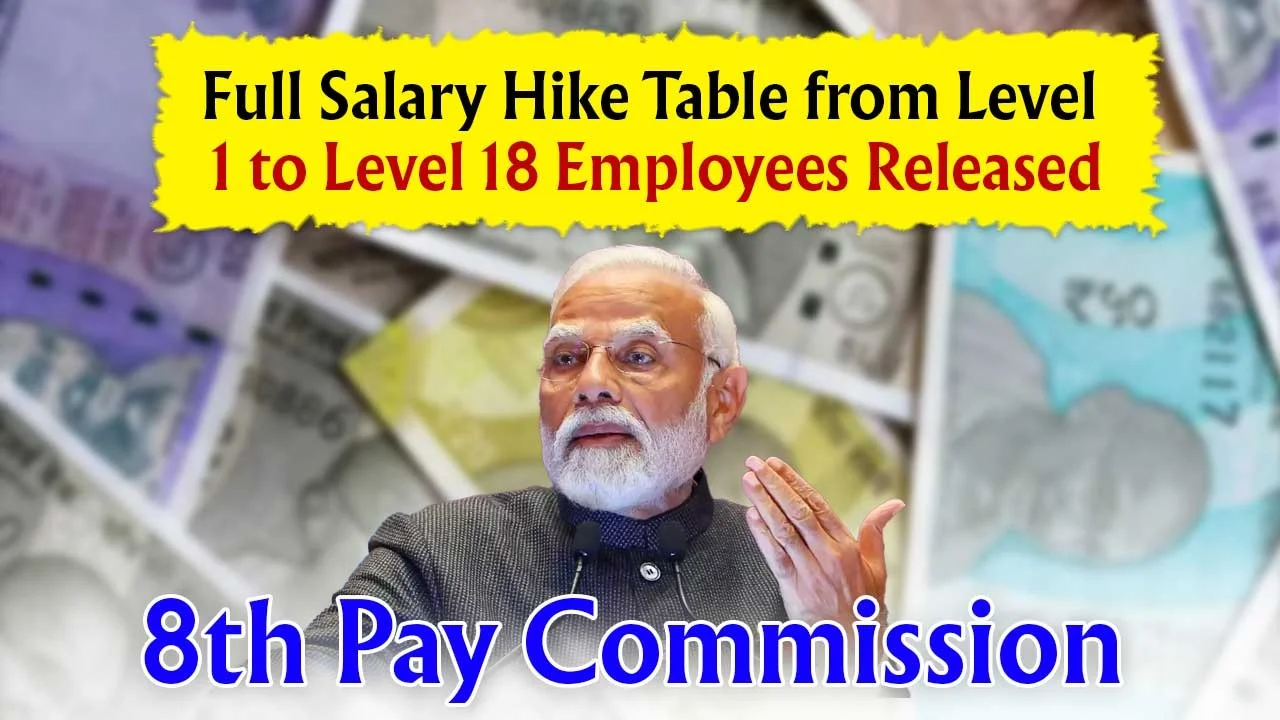8th Pay Commission Date Announced – Full Salary Hike Table from Level 1 to Level 18 Employees Released
There is big news for central government employees across India. The 8th Pay Commission has finally been announced, bringing with it hopes of a significant salary hike. This long-awaited move is expected to improve the financial position of millions of government workers and pensioners.
As per official updates, the 8th Pay Commission will come into effect soon, and a complete salary hike table for Level 1 to Level 18 employees has already been drafted. This will cover employees from the lowest to the highest ranks, ensuring everyone benefits in a fair way.
Let’s understand what this pay commission means, what kind of hikes to expect, and how it will affect employees and their families.
What is the 8th Pay Commission?
The Pay Commission is a body set up by the Government of India to revise the salary structure of its employees based on inflation, cost of living, and economic needs. The 7th Pay Commission came into effect in 2016. Now, nearly a decade later, the 8th Pay Commission is being rolled out to update salary structures once again.
This latest commission promises better pay scales, improved allowances, and stronger benefits for all government staff and pensioners.
Implementation Date Announced
According to official announcements, the 8th Pay Commission will be implemented from January 1, 2026. However, the report and salary structure details will be finalized and submitted in mid-2025. The new salaries are expected to be paid with arrears, covering the gap from the implementation date.
This is a major relief for employees who have been waiting for salary corrections and better allowance structures.
Expected Changes in Salary Structure
The 8th Pay Commission is expected to bring a minimum 20% to 30% increase in basic salary. Dearness Allowance (DA), House Rent Allowance (HRA), and Travel Allowance (TA) are also expected to be revised. Additionally, pensioners will see better benefits, especially with DA merger provisions.
Here’s how it will likely benefit different groups:
-
Level 1 to 5 employees may see basic pay hikes of ₹6,000–₹10,000.
-
Mid-level employees (Level 6 to 12) could get increases between ₹12,000–₹25,000.
-
Senior-level employees (Level 13 to 18) may receive even bigger jumps.
Overview Table
Here is a simplified table showing estimated basic pay hikes under the 8th Pay Commission, from Level 1 to Level 18:
| Pay Level | Current Basic Pay (7th CPC) | Expected New Basic Pay (8th CPC) | Estimated Hike |
|---|---|---|---|
| Level 1 | ₹18,000 | ₹23,400 | ₹5,400 |
| Level 2 | ₹19,900 | ₹25,900 | ₹6,000 |
| Level 3 | ₹21,700 | ₹28,200 | ₹6,500 |
| Level 4 | ₹25,500 | ₹33,200 | ₹7,700 |
| Level 5 | ₹29,200 | ₹38,000 | ₹8,800 |
| Level 6 | ₹35,400 | ₹46,000 | ₹10,600 |
| Level 7 | ₹44,900 | ₹58,500 | ₹13,600 |
| Level 8 | ₹47,600 | ₹62,000 | ₹14,400 |
| Level 9 | ₹53,100 | ₹69,000 | ₹15,900 |
| Level 10 | ₹56,100 | ₹73,000 | ₹16,900 |
| Level 11 | ₹67,700 | ₹88,000 | ₹20,300 |
| Level 12 | ₹78,800 | ₹1,02,000 | ₹23,200 |
| Level 13 | ₹1,18,500 | ₹1,53,000 | ₹34,500 |
| Level 14 | ₹1,44,200 | ₹1,85,000 | ₹40,800 |
| Level 15 | ₹1,82,200 | ₹2,35,000 | ₹52,800 |
| Level 16 | ₹2,05,400 | ₹2,65,000 | ₹59,600 |
| Level 17 | ₹2,25,000 | ₹2,95,000 | ₹70,000 |
| Level 18 | ₹2,50,000 | ₹3,25,000 | ₹75,000 |
What Will Happen to Allowances?
Along with basic pay, allowances are also expected to rise. Here are a few expected changes:
-
Dearness Allowance (DA): Likely to be reset to 0% from Jan 2026 and will start increasing again as inflation rises.
-
House Rent Allowance (HRA): May be revised to higher percentages – likely between 27% to 30%.
-
Medical Allowance: Better coverage and easier reimbursement processes for both serving employees and retirees.
-
Travel Allowance: Updated limits for local and long-distance official travel.
Pensioners and Retired Employees
The Pay Commission will also review pension structures. Senior pensioners above 80 years may get additional benefits. DA for pensioners will match the rates for serving employees, and there are discussions about merging DA with basic pension for smoother payments.
This comes as a major boost to retired individuals who often rely solely on pension for daily needs.
How It Impacts Employees
Government workers have welcomed this move with relief. It’s not just a salary hike—it’s also a signal of recognition and reward for their services. With better earnings, employees will have improved spending power, higher savings, and more financial security.
Frequently Asked Questions (FAQs)
Q1: When will the 8th Pay Commission be implemented?
The 8th Pay Commission will be implemented from January 1, 2026, but the groundwork and reports will be finalized by mid-2025.
Q2: Will arrears be paid from the implementation date?
Yes, employees are expected to receive arrears from Jan 2026 once the new salary structure is approved.
Q3: Who will be covered under the 8th Pay Commission?
All central government employees, defense personnel, and pensioners will be covered under the new pay commission.
Q4: What is the expected minimum salary after the 8th Pay Commission?
The minimum basic pay may rise to ₹23,400, up from the current ₹18,000.
Q5: Will allowances also be increased?
Yes, allowances like DA, HRA, and TA will be revised under the new structure, along with updated pension benefits.
Final Words
The announcement of the 8th Pay Commission has brought a wave of positivity for central government employees and pensioners. With a fair salary hike, improved allowances, and transparent implementation, it is seen as a balanced move that will boost morale and support economic stability.
As the detailed report gets finalized in 2025, employees are advised to stay updated and start preparing for the changes ahead. The next step is official approval, and once it’s done, millions will benefit from this much-needed revision.




